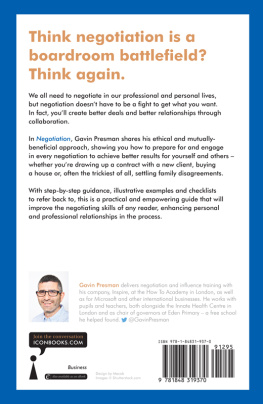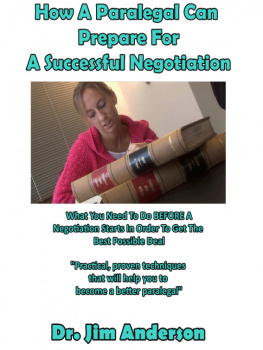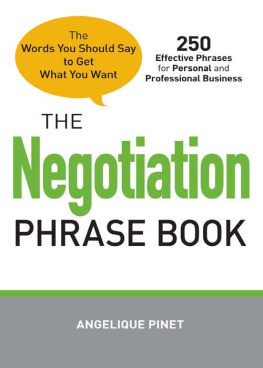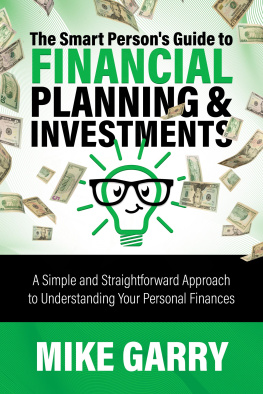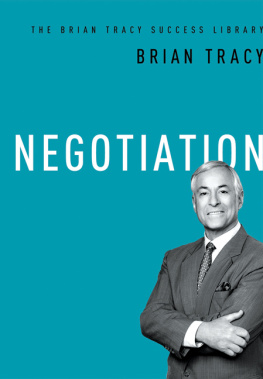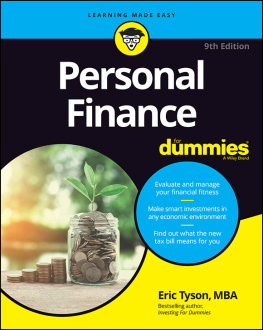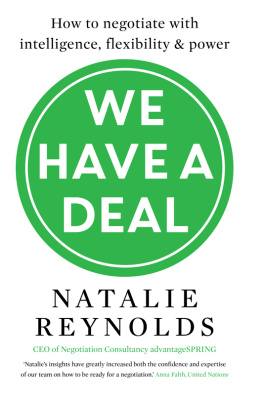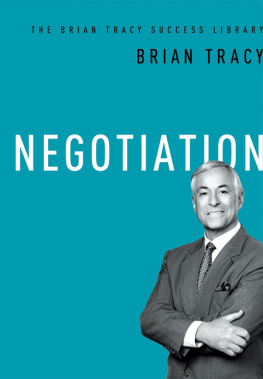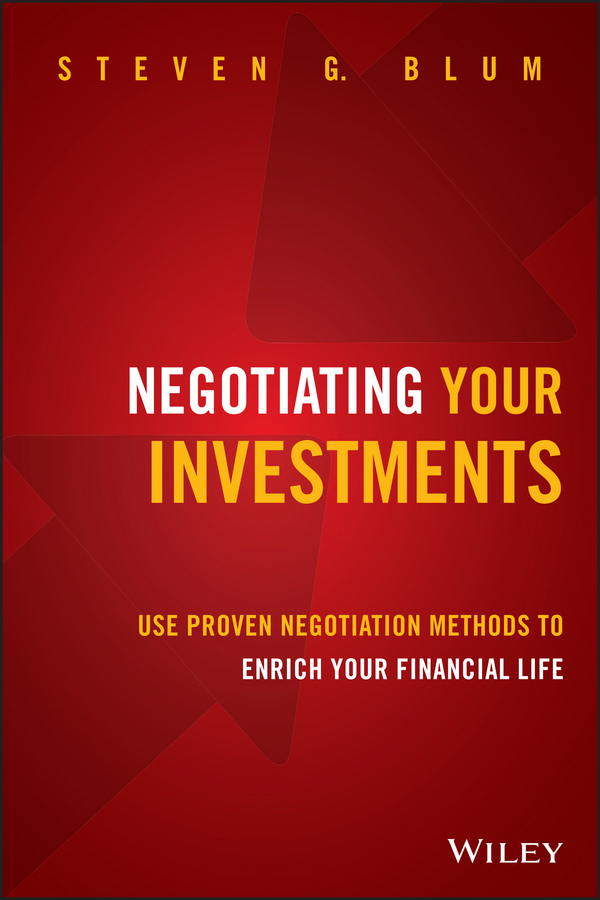
Contents
List of Tables
Pages
Guide
Negotiating Your Investments
USE PROVEN NEGOTIATION METHODS TO ENRICH YOUR FINANCIAL LIFE
Steven G. Blum
Cover design: Wiley
Copyright 2014 by Steven G. Blum. All rights reserved.
Published by John Wiley & Sons, Inc., Hoboken, New Jersey.
Published simultaneously in Canada.
No part of this publication may be reproduced, stored in a retrieval system, or transmitted in any form or by any means, electronic, mechanical, photocopying, recording, scanning, or otherwise, except as permitted under Section 107 or 108 of the 1976 United States Copyright Act, without either the prior written permission of the Publisher, or authorization through payment of the appropriate per-copy fee to the Copyright Clearance Center, Inc., 222 Rosewood Drive, Danvers, MA 01923, (978) 750-8400, fax (978) 646-8600, or on the Web at www.copyright.com. Requests to the Publisher for permission should be addressed to the Permissions Department, John Wiley & Sons, Inc., 111 River Street, Hoboken, NJ 07030, (201) 748-6011, fax (201) 748-6008, or online at www.wiley.com/go/permissions.
Limit of Liability/Disclaimer of Warranty: While the publisher and author have used their best efforts in preparing this book, they make no representations or warranties with respect to the accuracy or completeness of the contents of this book and specifically disclaim any implied warranties of merchantability or fitness for a particular purpose. No warranty may be created or extended by sales representatives or written sales materials. The advice and strategies contained herein may not be suitable for your situation. You should consult with a professional where appropriate. Neither the publisher nor author shall be liable for any loss of profit or any other commercial damages, including but not limited to special, incidental, consequential, or other damages.
For general information on our other products and services or for technical support, please contact our Customer Care Department within the United States at (800) 762-2974, outside the United States at (317) 572-3993 or fax (317) 572-4002.
Wiley publishes in a variety of print and electronic formats and by print-on-demand. Some material included with standard print versions of this book may not be included in e-books or in print-on-demand. If this book refers to media such as a CD or DVD that is not included in the version you purchased, you may download this material at http://booksupport.wiley.com. For more information about Wiley products, visit www.wiley.com.
Library of Congress Cataloging-in-Publication Data:
ISBN 978-1-118-58307-4 (Hardcover)
ISBN 978-1-118-58316-6 (ePDF)
ISBN 978-1-118-58315-9 (ePub)
For my beloved Adam, Libby, and Suzie.
To honor my parents, Harold Blum and Jean Blum.
And in memory of my grandparents, Adam Spiro, Tonia Spiro, Murray Blum, and Betty Reichler Blum.
Prologue
I have been negotiating all of my life. So have you. Negotiation is what happens when we want something from someone else or they want something from us. Thus, from our earliest moments to our dying day, we are negotiators.
Of course, we may not think of it that way. In my case, I had already become a lawyer and was busy trying to settle cases for my clients before I first had the chance to give much thought to the process. The young lawyer just did what many people do: shouted and threatened and waved his arms. (Of course, many other unskilled negotiators just accede to the other sides demands, make every effort to avoid the conflict, or just propose to split the difference.) There is a world of difference between being someone who negotiates and being a skilled negotiator.
Several years into my career as a lawyer, I got lucky. My supervising attorney handed me a copy of the book Getting to Yes. I found it amazingly helpful and, even more, deeply satisfying. There really were ways to think about, organize, plan for, and execute negotiations so as to do much better in them. My luck was a lot greater than just the book, though. I had already been admitted to a graduate program at Harvard, and, when I arrived on campus, I headed straight over to the Program on Negotiation at Harvard Law School to find out what other wonderful things they might have to offer me. As it happened, they invited me to take a series of courses culminating in what they called the Specialization in Negotiation and Dispute Resolution. By jumping at this offer, I had the opportunity to study with some of the greatest thinkers and teachers of negotiation in the world.
As I worked my way through classes taught by Roger Fisher, Bill Ury, Bruce Patton, Lawrence Susskind, Frank Sander, and David Kuechle, my understanding and skills got palpably better. Almost every teacher there was extraordinary. About one course, though, I cannot help boasting. The instructor in Conflict, Cooperation and Strategy never failed to amaze. His insights were astonishing, and his far-reaching mind took us to places we would never have been and understandings we would never have accomplished. That course was taught by then professor, now Nobel laureate, Thomas Schelling.
As an academic exercise, studying negotiation at Harvard was sublime. I loved the topic and got to think and write about it with some of the greatest teachers at a pinnacle of academic thought.
To my amazement and delight, though, the real-life part of the exercise was also bearing remarkable fruit. I was getting better as a negotiator. A lot better. My entire life started looking up as I built healthier relationships, planned more effective communication, worked to meet my own underlying interests as well as those of the people around me, and began to focus on and strengthen my BATNA. I was also introduced to the question that has come to be something of a guiding light in my life: What is a good outcome? I had become a genuine expert in what the world calls the Harvard method of negotiation.
It was a little bit like finding a magic genie in a bottle. This stuff really works, I remember telling a friend. I began to have stronger friendships, better alliances, greater satisfactions, and more money. Perhaps of even greater importance, I learned to focus on what I really wanted and on how to guide other people toward providing it to me. Of course, they tended to offer it in exchange for what they really wanted, but I began to see that not as a problem but as a huge new set of opportunities. Everybody wants something, and I can help them get it. In the process, I can get a great deal of what I want. It felt a bit like a new life.
A few years later, I got lucky again. After working for a number of years at Dartmouth College, I was asked to take a position at the University of Pennsylvania. My practical negotiating skills came in handy as I was able to persuade Wharton to let me teach a version of what had so delighted me at Harvard. (To be more accurate, I negotiated my way into taking over a class for Professor Edward Shills when he fell ill.) I have been teaching there ever since.
With intellectual leadership from Chairman Richard Shell, pedagogic development by colleagues such as Maurice Schweitzer, Adam Grant, and Jennifer Beer, and extraordinary promotion by Stuart Diamond, a remarkable core of thinking and writing about negotiation has grown at Wharton. And, of course, I have been one of its greatest beneficiaries. In teaching negotiation and conflict resolution at Wharton for over 20 years, I have also been a continuous student of the techniques, methods, skills, and habits of mind that make a negotiator successful. My own proficiency has improved continuously through teaching, thinking, practicing, and paying attention to colleagues. I am deeply enriched by the process of guiding new students through the stages of learning about what negotiation is, how it works, and how to do it better. It continues to be true that I learn something new every time I teach.
Next page

